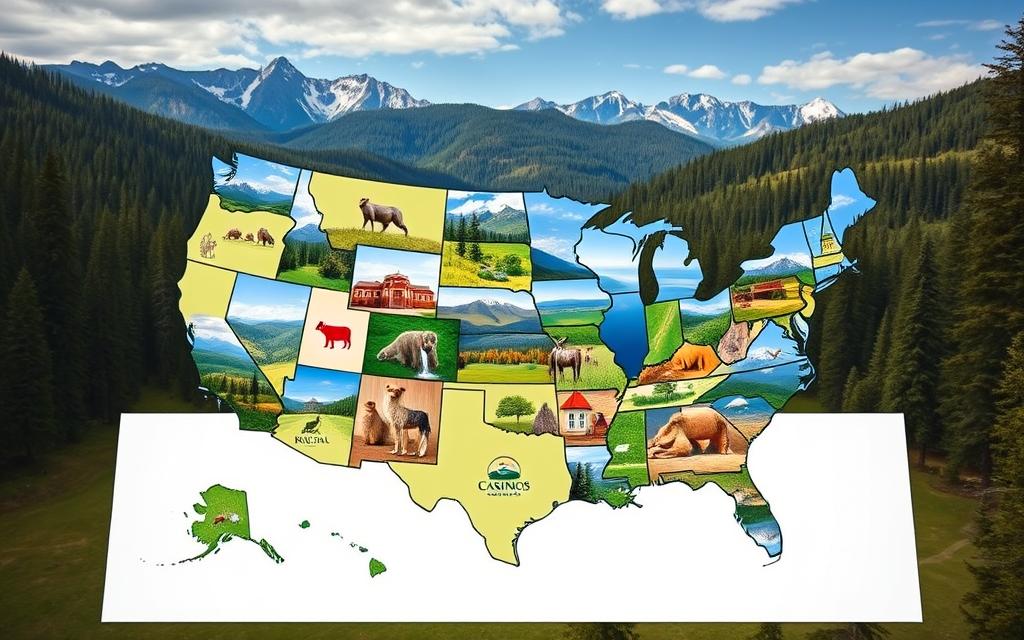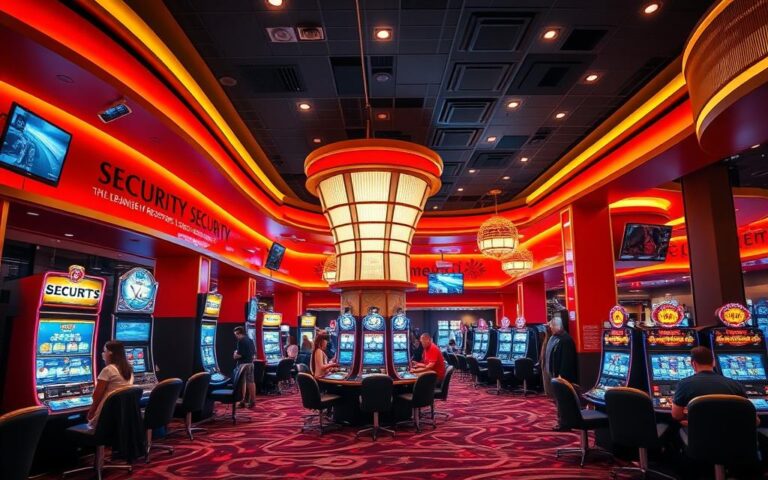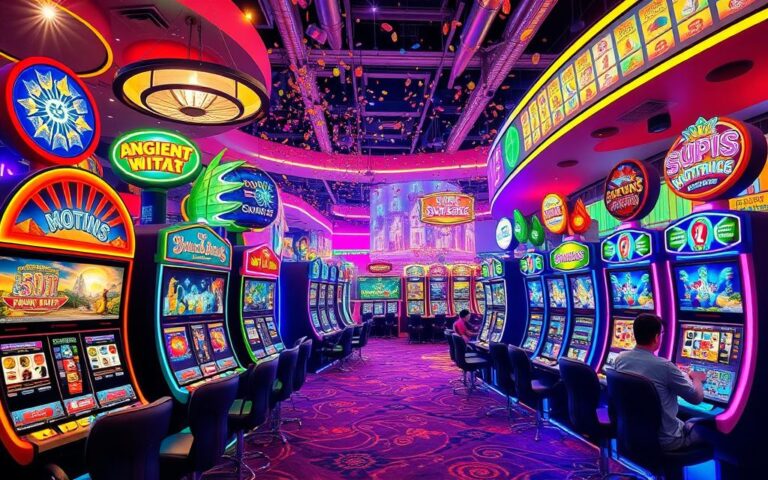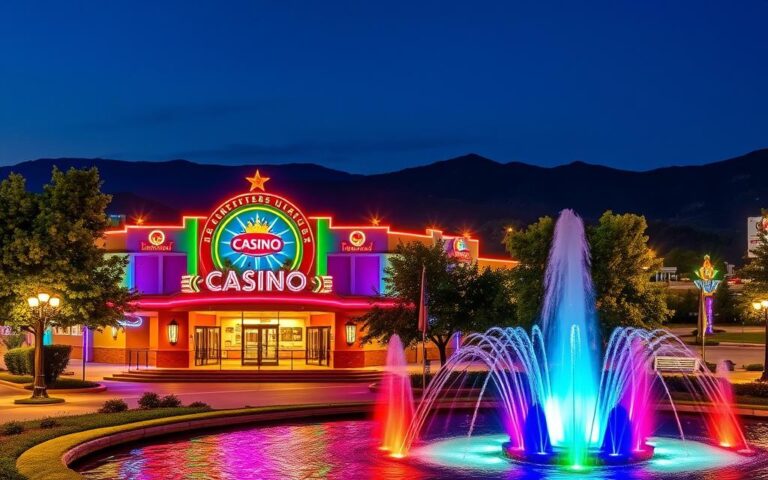U.S. States Without Casinos
America’s gambling laws show a variety of approaches. Interestingly, Utah and Hawaii stand out as the only states firmly against gambling. They say no to casinos, lotteries, and even charity events. This shows a different culture and law contrast compared to the other 48 states. These enjoy a wide range of legal gambling activities.
We’ll look closer at how these strict laws impact local economies. It’s also interesting to see the different gambling regulations across America. By understanding America’s gambling laws, we get a clear picture of the country’s varied stance on gambling.
Understanding the Gambling Landscape in America
The United States has a complex gambling scene due to different state laws. These laws decide what types of gambling are allowed. Every state has the power to allow, regulate, or ban gambling. This creates a unique gambling landscape in each state. We’ll look at how state laws affect gambling types and rules.
The Role of State Legislation
State laws are key in shaping the gambling scene. They change a lot from state to state. For example, New Jersey supports online casinos, poker, and sports betting thanks to its forward-thinking laws. On the other hand, Utah and Hawaii have strict rules against all gambling.
In 2006, the Unlawful Internet Gambling Enforcement Act (UIGEA) made online gambling more complicated. This act tries to stop illegal online gambling. It affects how states manage online betting and casinos. Nevada allows online sports betting but not online casino games, showing this complex situation.
Types of Gambling Allowed by State
Various states allow different kinds of gambling. This includes both traditional and modern ways to gamble. Here’s a brief overview:
| State | Online Casinos | Sports Betting | Tribal Casinos |
|---|---|---|---|
| New Jersey | Yes | Yes | Yes |
| Pennsylvania | Yes | Yes | Yes |
| California | No | Pending Legislation | Yes |
| Nevada | No | Yes | Yes |
| Texas | No | Pending Legislation | No |
| West Virginia | Yes | Yes | Yes |
Online betting is getting more popular, with 38 states and Washington D.C. allowing it. Interestingly, 30 states let people bet online. Laws are changing, and more states might support online gambling soon. This shows more people are accepting online betting.
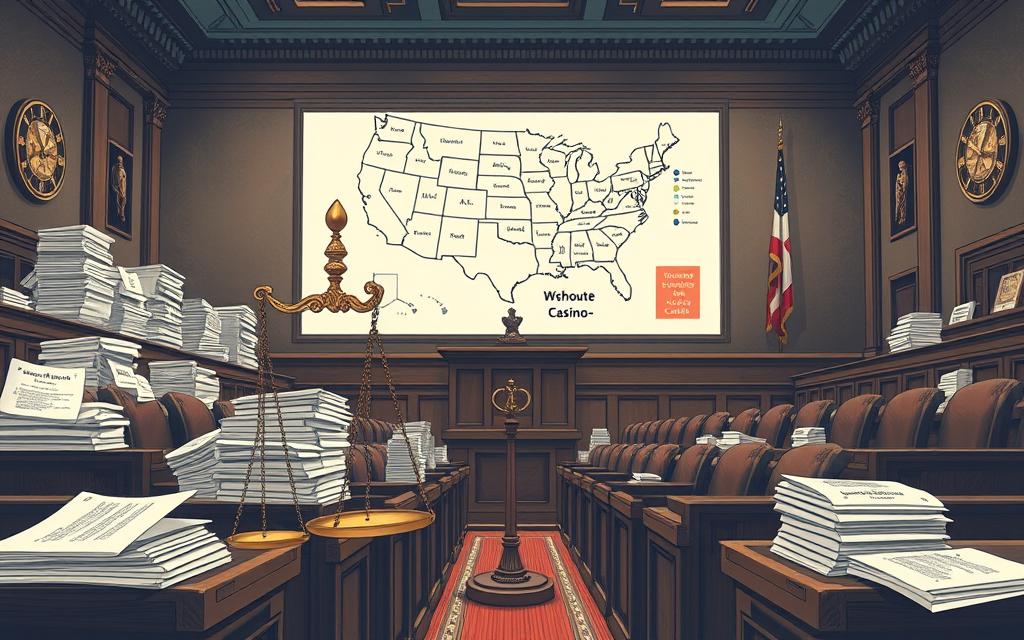
What States Don’t Have Casinos
In the US, a few states stand firm against gambling by not allowing casinos. Cultural, legal, and societal reasons are behind this. Utah and Hawaii are prime examples, with their unique approaches to this issue.
A Closer Look at Utah
Utah’s laws on gambling are very strict, directly reflecting its cultural and religious beliefs. This leads to a complete ban on all types of gambling. As a result, you won’t find any casinos there. People often travel to nearby states to gamble.
The Case of Hawaii
Like Utah, Hawaii also has strong laws against gambling. It even bans gambling on cruise ships. This shows Hawaii’s strong stand on keeping a gambling-free community. The locals’ views greatly influence these strict rules.
Other States without Legal Casinos
Besides Utah and Hawaii, states like New Hampshire, Vermont, and Alaska also don’t have casinos. However, they allow some gambling activities:
| State | Gambling Options |
|---|---|
| New Hampshire | Lottery, Online Casinos |
| Vermont | Lottery, Bingo, Racinos |
| Alaska | Lottery, Dog & Horse Betting, Native Casinos |
| Georgia | Lottery, Sports Betting, Charitable Bingo |
| South Carolina | Lottery, Sports Betting, Charitable Bingo |
These states choose alternatives to casinos, like lotteries and other betting options. This choice affects their social and economic landscape in unique ways.
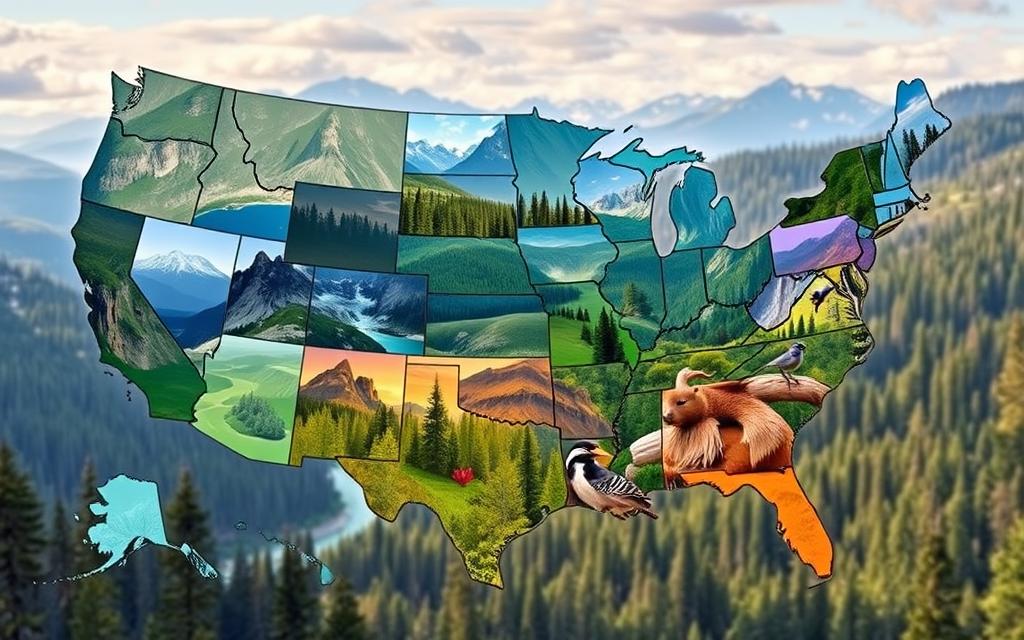
Variations in Gambling Laws Across States
Gambling laws in the United States vary greatly. They are shaped by commercial interests and tribal rights. In every state, you’ll find different rules because of commercial and tribal casinos. To understand the impact of gambling restrictions, you must know these differences.
Commercial vs. Tribal Casinos
Commercial casinos are run by private companies. Tribal casinos are found on Native American lands. They follow tribal agreements. Each type influences where gambling can happen.
- Commercial Casinos: In states like Nevada and New Jersey, these casinos boost the local economy. They create jobs and bring in tax revenues.
- Tribal Casinos: Arizona has over 20 tribal casinos. They support Native communities and welcome all players.
Every state has its own rules for casinos. This changes how gambling works there. Illinois and Michigan allow commercial casinos and online betting. Utah and Hawaii ban all gambling.
Restrictions on Gambling Activities
States have different rules for gambling. Some embrace it, and others restrict it:
- Pennsylvania and New Jersey have many gambling options. They include iGaming and sports betting.
- Alaska has strict laws against casino games. This limits gambling choices.
- Tribal casinos work under special agreements in some states. They offer limited gambling in places with tight rules.
The mix of casino types and state laws creates a complicated picture. Some states make a lot of money from gambling. Others do not allow it at all.
| State | Commercial Casinos | Tribal Casinos | Gambling Restrictions |
|---|---|---|---|
| Nevada | Yes | Yes | None |
| New Jersey | Yes | Yes | None |
| Utah | No | No | All forms of gambling illegal |
| Hawaii | No | No | All forms of gambling illegal |
| California | Yes | 76 | Regulated forms permitted |
| Pennsylvania | Yes | Yes | Varied based on type |
Reasons Behind the Restrictions on Gambling
Exploring the gambling restrictions reasons highlights cultural and economic influences. These factors impact states that limit gambling activities. Communities worry about social issues gambling worsens, like compulsive gambling and crime. These concerns drive resistance against casinos and regulated gambling venues.
Concerns About Social Issues
Opposition to gambling comes from its potential to increase crime and disrupt society. Critics believe gambling boosts addiction, affecting individuals, families, and communities. Such views strongly influence public opinion, pushing lawmakers to limit gambling.
Economic Considerations
States are divided on economic impacts of gambling. Some see it as a chance to earn tax money. Yet, critics argue gambling hits low-income folks hardest. States with strict rules miss out on big tax benefits from the growing gambling industry. For more on gambling restrictions, check this resource.
| State | Legal Gambling Age | Key Restrictions | Tax Revenue Potential |
|---|---|---|---|
| New Hampshire | 18 | All games of chance illegal, maximum bet of $4 in charities | Limited; potential gains from casinos missed |
| Utah | 21 | Strictly prohibits all forms of gambling | Non-existent |
| Hawaii | 18 | All forms of gambling illegal | Untapped; significant potential revenue |
| Alabama | 21 | Restrictions on casinos and gaming facilities | Potentially high with proper legislation |
The Impact of Gambling Absence on State Economies
The lack of casinos in some states has a big impact, especially on tax money and helping local businesses grow. States without casinos lose the chance to make extra money. This money could help public services and roads. For example, 15 states get about $4.5 billion every year from casino licenses. But states without casinos have to find other ways to get this money.
Tax Revenue Loss
States without gambling income face money troubles. Take New York, for instance. It’s trying to fix a $4.3 billion money shortfall. A legal gambling industry could really help. State lotteries make about $18 billion a year in 43 states. But this isn’t enough compared to what casinos could bring in. Without this extra money, it’s tough for states to support important public services.
Local Business Effects
Local businesses also feel the impact of not having casinos. These businesses miss out on customers casinos would bring. Nearby restaurants, hotels, and spots for fun lose the chance for more business. Some states even saw people spending less after the lottery started. This drop in spending hurts small, local companies. Clearly, no gambling not only hits state funds but also stops local businesses from doing well.
FAQ
Which U.S. states do not have casinos?
Utah and Hawaii do not allow any gambling. States like Alaska, Tennessee, Vermont, Virginia, and New Hampshire have strict rules.
What are the main reasons for prohibiting casinos in certain states?
Bans stem from cultural and religious views. Fears of crime and compulsive betting are concerns. The impact of gambling taxes also plays a part.
How do state laws impact the types of gambling permitted?
States decide on gambling types themselves. This includes lotteries, sports betting, and casinos. The rules for these can differ a lot.
What economic effects do the absence of casinos have on states?
No casinos mean states lose tax income. Local businesses miss out on tourism and entertainment profits.
Are there any exceptions to the types of gambling allowed in states with restrictions?
Yes, some states allow charity games or lotteries. Even if they say no to casinos, there are exceptions. Regulations change a lot, too.
Can gambling laws change in the states that currently prohibit casinos?
Laws can change with time. Changes in public opinion and economic benefits can push lawmakers. This means gambling laws may get updated.
